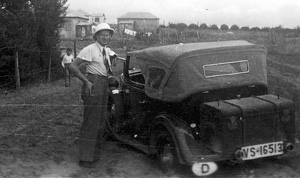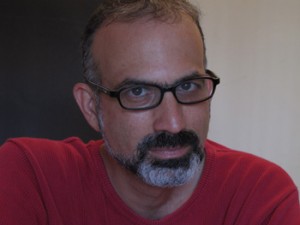Arts
Personality
Meet the Director, Arnon Goldfinger
When Israeli filmmaker Arnon Goldfinger cleaned out his recently deceased grandmother’s flat, he discovered decades’ worth of correspondence between his grandparents and one Baron Leopold Itz Edler von Mildenstein. As Goldfinger researched these strange letters, he was shocked to learn that von Mildenstein was the Nazi who formulated the policy of repatriating Jews to Palestine, adopted by the Judenreferat Department of the intelligence branch of the SS. Von Mildenstein was also Eichmann’s protector within the department. The Flat is Goldfinger’s attempt to discover why his grandparents traveled to Palestine with von Mildenstein in 1933 and why they maintained their friendship with the former Nazi for decades after World War II. Availability: Check your local listings; on demand from IFC Entertainment.
Q. When your grandparents continued their relationship with von Mildenstein after the war, do you think they knew what he did before and during the war?
A. There’s a moment at the end of 1936 that you can see in the film. At the end of ’36, von Mildenstein quit the Judenreferat, the Department for Jewish Affairs in the Secret Service. A few weeks later, my grandfather and grandmother immigrated to Palestine. So at that moment, I think that at least my grandfather knew quite well—at least officially—that von Mildenstein was in the Judenreferat. He didn’t know all the activities, of course, but at least this he knew for sure. I wonder, though, what happened at the first meeting after the war. Rather than tell his daughter the truth, von Mildenstein told her that he quit his job and traveled around the world, so I can’t believe that he told my grandparents, “I did such and such in the war.” I don’t think they really knew, but they also didn’t ask. Even researchers and historians don’t know what von Mildenstein did during the war, so I quite believe that my grandparents didn’t know. The thing is, there was also a decision not to talk about what happened during the war.
Q. Where did your grandparents meet von Mildenstein, and what were the circumstances of their trip to Palestine?
A. They met in Berlin, and they went to Palestine together, on the same ship. First they took a car from Berlin and traveled to Italy, and then they took the boat to Palestine. They were traveling together for almost three weeks before they got on the ship. It was strange, because it was already after the Nazis took power.

Q. Of the many disturbing aspects of your film, the part that troubled me most was the German historian’s explanation for the reason your grandparents kept returning to Germany—that they needed to find just one good German. It seems so desperate.
A. I don’t see their behavior as pathetic. I see their behavior as a way—maybe a wrong way—to deal with a lot of pain and sorrow. We cut out a scene where my mother and I went to visit my grandparents’ last flat in Berlin. Imagine somewhere like Fifth Avenue, a very wealthy area. The current owner of the flat had found the floor plan from the 1930s. Over the years they’d changed the flat, but you could see how my grandparents had lived there. They’d had a seven-room flat, with huge rooms like you see in the movies. With a cook, a room for a cook and a room for a nanny. I asked my mother, “Did you have a nanny?” And she said, “Who do you think raised me?” This is the kind of life they had to leave behind…. When someone kicked them out of this Berlin way of life, they told themselves it [was] only for a certain period of time. They had a need to go back to Germany. They didn’t really assimilate in Israel. And I should point out that they weren’t in concentration camps. For sure they knew what was going on in the streets, for sure they knew the mechanism of what was going on, but they didn’t see the real horrible things. I think this helped them to be able to deny. I think what’s interesting in the film is that first you say, Whoa, how can that be? And then you see that this is a mechanism for surviving psychologically.
Q. You’ve made two films that are diametrically opposite—The Komediant (a documentary about Yiddish actor Pesach Burstein) and The Flat.
A. I see a lot of equivalence between the two films. They both deal with family. They both deal with aspects of Jewish history that aren’t much told; they’re out of the mainstream. The Bursteins were Jews, they were immigrants, but they were not Zionists. My grandparents were ardent Zionists—especially my grandfather, who was a very active representative of the Zionist federation in Berlin (this was the reason for his trip with von Mildenstein to Palestine). However, the heads of both families (“the first generation”) could not leave their origins behind to fully merge in Israel.
My grandfather succeeded in Israel. He made a life. He was creative. But 90 percent of his friends were Yekkes. The clubs, the social meetings, the coffees, the business…everything was in the territory of the Yekke immigrant. They were not involved in Israeli politics. They were a closed group that succeeded in business and industrial life. Most of their life they spoke German in Israel. They went back to Germany every year, every two years. The minute they could fly back, they did.
Q. What do you think is happening as the Holocaust generation dies off in Israel?
A. My answer will be from a different angle. I was very much afraid of Yad Vashem’s response to the film. Why was I afraid? Because in this film you don’t see anyone from the first generation. And it tells an untold story. When we showed the film in Jerusalem and the representative from Yad Vashem saw it, she came to me and told me, ‘Arnon, this is the way now. These are the films we’re looking for, because you present a new stage of the connection between the current generation and the Holocaust.’ They didn’t support me with money, but they did with research. On the one hand, the day’s not far when the survivors will all be gone. But, on the other hand, the fact that people in our generation have distance gives us the power to look in a new perspective.
The film is very successful in Israel, and many people identified with what’s going on in the film—not the specific story, of course, but many people came to me and told me that they didn’t talk [about the Holocaust] in their families.
Q. On the very first day of filming, you went to the flat with a camera, not knowing what you would find. Why?
A. The Komediant was a very successful film. I found a way to express myself. [But] it took me four years to make and another three to run with it. It’s a lot of time just on one film, so I had to be very picky about my next project. After you make a successful film, especially a documentary, people come to you and say, ‘We have a good story. Can you do something with it?’ I heard lots of good stories. And each one of them deserved a film, but I wasn’t going to do them. I waited so many years that I just decided I wasn’t going to make a film. And then when my grandmother died, I had an idea to make a short film, by myself, without a big crew, just to be on track again. That’s how it all started. I knew this flat very well. I knew this was a world that would be gone in a few minutes or a few days—all these German words that were living on special reserve. I said to myself, either you are making a small, short film in a few days or you’re making archives for your family. So that’s how it all started.
Q. What are you working on now?
A. On the distribution of the film. Unbelievably, it’s still an ongoing process. You make a film, you work on it for five years, it’s finished, and you think that’s it. But then it’s not, it’s only a new start. It’s a new journey.
Copyright © Director Talk 2012









 Facebook
Facebook Instagram
Instagram Twitter
Twitter
Leave a Reply